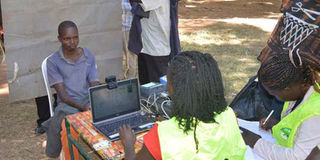IEBC calls for new guidelines in use of technology

An IEBC clerk enlisting a Kakamega resident as a voter at Muliro Gardens on January 16, 2017. Electronic results transmission will be expensive. PHOTO | ISAAC WALE | NATION MEDIA GROUP
What you need to know:
- Mr Chiloba said the IEBC is exploring the possibility of using satellite technology to support transmission of results, especially in areas where internet connectivity is low.
- Meanwhile, changes to the electoral laws approved by Parliament in January increasing the number of voters per polling station from 500 to 700 have come as a relief to the IEBC.
The cost of the General Election could go up significantly because of the requirement in the law that results be transmitted electronically.
Mr Ezra Chiloba, the Independent Electoral and Boundaries Commission (IEBC) chief executive officer, said the decision on what technology would be used in areas without adequate mobile phone coverage is yet to be made.
Also, he said Thursday that the Justice and Legal Affairs Committee had asked the IEBC to prepare guidelines on how they would implement the requirement for technology in the registration and identification of voters and the transmission of results.
He added that the commission and the Communications Authority of Kenya (CA) have since set up technical teams to handle the matter.
Mr Chiloba said the IEBC is exploring the possibility of using satellite technology to support transmission of results, especially in areas where internet connectivity is low.
“We are coming up with options and those options will be brought to Parliament,” he said at a meeting of the new commission, Speakers of the Senate and the National Assembly, chaired by Mr Wafula Chebukati at Parliament Buildings, Nairobi.
Although the law was amended to give the IEBC the option of going manual in the event of a failure of the electronic systems, it is keen on having technology as the primary means.
Meanwhile, changes to the electoral laws approved by Parliament in January increasing the number of voters per polling station from 500 to 700 have come as a relief to the IEBC.
The earlier cap would have increased the number of polling stations from 44,000 to 57,000, which would have increased the cost by Sh10.7 billion.
NEW REGULATIONS
The IEBC was allocated Sh19 billion in the current financial year and another Sh19 billion in 2017/2018, the period during which the elections will be held.
The Treasury has allocated it an additional Sh2 billion in the Supplementary Budget.
Mr Chebukati appealed to Parliament to support the IEBC, saying proper legislation and an adequate budget were important ingredients to a free, fair and credible elections.
Mr Chebukati and Mr Chiloba said there is a need to fast-track the development of relevant regulations, mainly arising from the recent changes to the law, to guide the elections.
They said regulations to guide political parties, nomination of candidates, voter education and ICT are some of the pending work that Parliament must speedily approve ahead of the polls.
“Parliament is a critical player in the elections and operations of IEBC,” said Mr Chebukati. “The regulations are either in Parliament or coming.
“The regulations must be in place on time to meet our strict timelines.”
Mr Chiloba said that although the latest changes to the election laws were substantial and far-reaching, the debate has been so much on use of technology.
PURIFIED PROCESS
The IEBC, he said, had developed regulations on ICT and is working on the ones to guide political party nominations after Parliament changed the timelines for compliance.
Speaker of the National Assembly Justin Muturi and his Senate counterpart Ekwee Ethuro appealed to IEBC officials to invest in restoring public confidence in the commission to avoid the clamour for change of office bearers after every election year.
“The practice of removing commissioners after every election will not be there if you win public confidence,” Mr Ethuro said.
He observed that elections are a highly partisan and emotive political process that requires the IEBC, as the referee, to act in a manner that is independent and impartial to produce credible results.
Said Mr Muturi: “Do the engagements in the open to avoid suspicion.”





